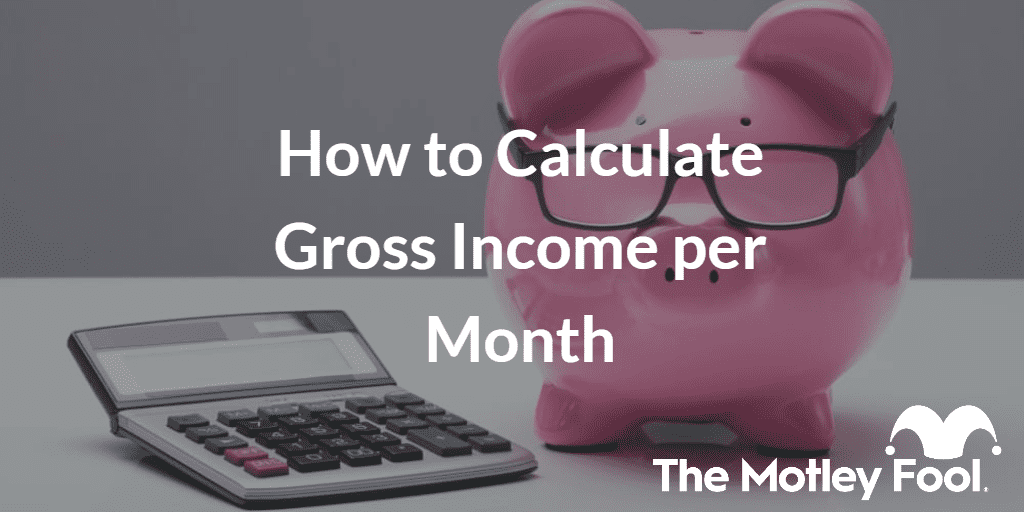- What’s included in your gross income?
- How do you calculate your monthly gross income?
- Calculating monthly gross income with an annual salary
- Calculating monthly gross income with an hourly rate
- Why is your monthly gross income important?
- What’s the difference between monthly gross income and net income?
- Foolish bottom line
Gross income is the money you earn before taxes and other deductions reduce it to your net income. Most people know their net income: it’s the money that comes into your bank account in the form of paycheques and helps you create your budget. Yet, knowing your monthly gross income is also important, as it can help you get approved for a loan or calculate how much retirement savings you need to sock away.
How do you calculate your monthly gross income? Let’s take a closer look.
What’s included in your gross income?
Your gross income is the sum of everything you earn within a specific period. If you were a business, your gross income would be all revenue that was “top line.” Sources that contribute to gross income include:
- Salary
- Bonuses
- Commissions
- Income from side gigs or freelance work
- Rental income
- Investments (such as interest, dividend payouts, and capital gains)
In contrast to gross income, your net income is the amount you earn after taxes and deductions (like insurance premiums or certain group RRSP contributions).
How do you calculate your monthly gross income?
Calculating your monthly gross income is fairly simple. But the calculation will differ based on whether you earn an annual salary or if you’re paid hourly. Let’s take a look at both.
Calculating monthly gross income with an annual salary
If you earn an annual salary, calculating your monthly gross income is pretty straightforward. More than likely, you know how much your annual gross income is (it’s the number your employer quotes to you before you’re hired). To arrive at your monthly gross income, you just have to divide your annual salary by 12.
Gross Monthly Income = (Annual Salary ➗12)
For instance, let’s say you receive an annual salary of $84,000. You also earn $3,000 per month (or $36,000 per year) in rental income, and you work a side hustle that earns you $12,000 per year. In this case, you’ll take your cumulative income ($84,000 + $36,000 + $12,000 = $132,000) and divide by 12. The resulting quotient comes out to $11,000 in gross monthly income.
Of course, because many get paid biweekly, it might be wise to know your biweekly gross income, too. To arrive at this number, just divide your monthly gross income by two. For the example above, that means your biweekly gross income is $5,500.
Calculating monthly gross income with an hourly rate
Calculating your monthly gross income with an hourly wage is a bit more difficult, but fortunately not too math-intensive for your basic calculator. To calculate your gross monthly income, you’ll have to go through three steps:
- Multiply your hourly wage by the number of hours you work every week
- Multiply the resulting product by the number of weeks in a year (52)
- Divide the product by 12
As a formula, it looks like this:
Gross Monthly Income = (Hourly Wage x Hours per Week) x 52 ➗12
Now, for those who work variable hours, that is, you work a different number of hours each week, you might have to take your best guess as to the average hours you work weekly.
Let’s look at an example. Let’s say you get paid $30 per hour, and you work 40 hours per week. According to the steps above, you’ll first determine how much you get paid weekly, which comes out to $1,200. Multiply this by 52, and you get $62,400. Divide by 12 to get your gross monthly income: $5,200.
Why is your monthly gross income important?
Perhaps the best reason to know your monthly gross income is to help you calculate how much you should sock away for retirement. Most experts agree you should save around 10% to 15% of your gross annual income for retirement. Your monthly gross income helps you understand how much you should be contributing every month to retirement. If your gross monthly income is, say, $6000, then you’d want to put $600 to $900 in a retirement account.
Your monthly gross income can also help you apply for loans or credit. Most lenders will look at your gross monthly income to decide if you have the financial support to pay back what you borrow. If your gross monthly income is above a certain threshold, they’ll feel comfortable letting you borrow the amount you requested. In the same way, some landlords might ask for your gross monthly income, which helps them decide if you have the income to pay your rent.
What’s the difference between monthly gross income and net income?
In contrast to gross income, net income is the sum total of your annual gross income, taxes, and all deductions. It’s basically the “take home” amount that enters your bank account on payday.
Knowing your monthly net income is also important, as it can help you create a realistic budget.
Foolish bottom line
Knowing your gross monthly income helps you understand how much money you’re earning before you factor in taxes and deductions. As long as you know how much money you earn per year (or how many hours you work per week and how much you make per hour), you should have no problems calculating your monthly gross income.

